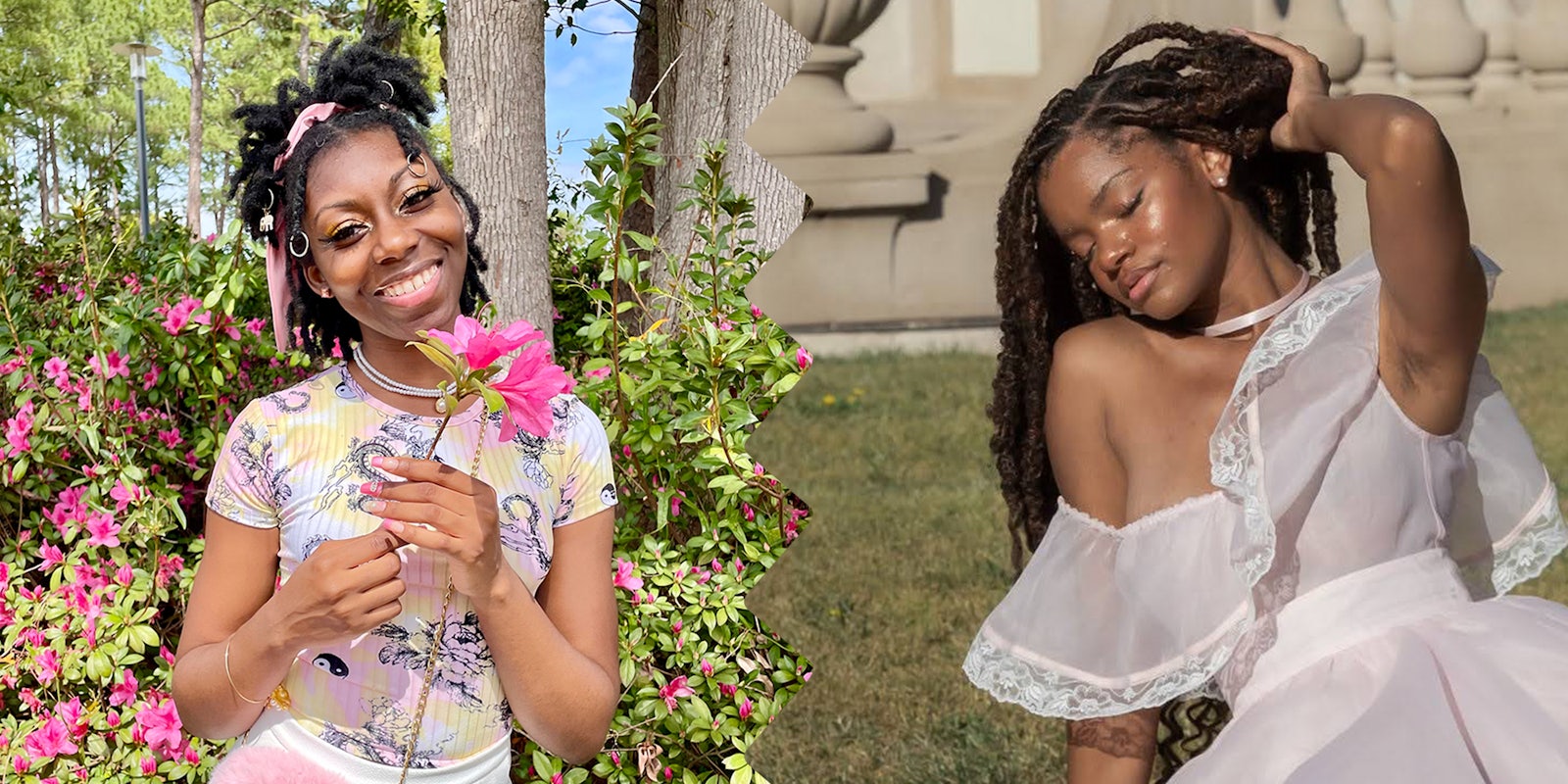Since before Barbie first hit theaters, it seems like pink has been everywhere. From reclamations of the much-ridiculed color to the virality of aesthetics like coquette and Barbiecore, women’s fondness for America’s favorite doll has launched hyper-femininity back on the map.
Among the plethora of frilly, sparkly “cores” you may have come across while scrolling through TikTok, princesscore has been making the waves recently. Like adjacent aesthetics—fairycore and regencycore, princesscore takes a romanticized lifestyle (in this case, royalty) and turns it into a camera-ready fashion style for social media. Looking through the #princesscore TikTok page, you’ll find almost one billion clips of meticulously groomed women wearing glimmering slippers, twinkling tiaras, and jaw-dropping dresses.
However, something glaringly problematic lies amid the dreamy pink fantasies that these women sell. Few women of color are included in princesscore, and most of the content at the top of the #princesscore page comes from white women and brands that have capitalized off the aesthetic. In a society where representation matters and women of color are stereotyped as un-feminine, their inclusion in feminine spaces is important.
Two Black princesscore TikTokers, Pristiny Deshia and Chazlyn Yvonne, have set out to do just that. Native Georgian Deshia first discovered the aesthetic in 2021 thanks to two faces of the Black princesscore movement, Megan Swan and Porsha Renae Hall. Deshia had always been “fascinated with pink and girly things” since childhood, so that aesthetic aligns perfectly with her style. “When I got older,” she says, “I was like, ‘You know what? I’m going to express who I am and release my inner child.’” On the other hand, Los Angeles-based Yvonne became a princess by way of related aesthetics. She shares, “When I first started posting, I was kind of into [the] cottagecore style, and then I found out about princesscore … and I was like, ‘Woah, this is so cool.’”
@pristiny_deshia Lets be friends 🫶🏾🎀☁️#GirlyAesthetic #GirlyGlam #GirlyTiktok #GirlyThings #GirlyOutfits #Femininity #hyperfeminine #hyperfeminity #hyperfemininaesthetic #blackfemininity #GirlyGirlFashion #GirlyFashion #GirlyGirlAesthetic #GirlyTok #FeminineJourney #SoftGirl #SoftGirlAesthetic #SoftGirlEra #SoftEra #DevineFeminine #DevineFeminineEnergy #PinkThings #Pink#Coquetteaesthetic #coquettecore #coquette #coquetteblackgirl #blackcoquette #princess #blackprincess #blackprincesscore ♬ Follow me dgibbsofficial – Dominic Gibbons
Beyond TikTok, Yvonne and Deshia have sought to spread the princesscore gospel. In the former’s case, she attended her first New York Fashion Week as an ambassador for whimsical brand Selkie this past fall, whereas Deshia has shared her loc journey on her YouTube channel. Yvonne shares that while it’s become customary for many brands to adopt a “minimalist … street style,” it was a dream come true for her as a Black princesscore creator to sit front row at shows with an aesthetic similar to hers. Deshia says sharing her loc journey as a princesscore TikToker is important because she wants to show that women of all hair textures and hairstyles can be soft and feminine, too. “As a Black woman, you don’t really think that feminine women can have locs. So I want to be a representation of a princess with locs for young Black girls,” she says.
By embracing their authentic selves, Deshia and Yvonne are actively challenging stereotypes about Black women and providing the representation they didn’t have while growing up. Explaining that Black women “aren’t really seen as soft and feminine,” Deshia says that she wants to “inspire other women and young girls into the princesscore aesthetic because growing up, I didn’t have that.” Both Yvonne and Deshia share that their only representation of Black princesses during their childhood consisted of Princess Tiana from Disney’s The Princess and the Frog and Brandy Norwood’s Cinderella from the eponymous 1997 movie.
In 2023, however, much has changed. Films like Barbie and the live-action version of The Little Mermaid have provided representation for hyper-femininity, particularly Black femininity. As Yvonne explains, “I feel like both of them have really started … this renaissance for unlocking and healing your inner child, especially for Black girls. I mean, none of us saw ourselves as mermaids … until Halle Bailey was portrayed as Ariel.” She also points out that “In Barbie, we have Isaa Rae as … a beautiful Black woman being the president of Barbie Land, and I think things like that are really important.” Weighing in on the representation the films have provided, Deshia says, “It’s like this new wave of princesses … and overall feminine aesthetics, and it’s really good to see that this is now becoming a big thing.”
@chazlyn.yvonne Literally the best day ever! 💗#airbnb #kensdreamhouse #barbiethemovie #barbiemonth #gretagerwig ♬ Dance The Night (From Barbie The Album) – Dua Lipa
Amid the public’s growing acceptance of hyper-femininity, Yvonne and Deshia hope that their content will help Black women express their feminine side. Deshia says, “I want to be a representation for other women and young girls to be inspired to know that ‘Hey, you’re a young Black girl, and it’s okay to be soft and feminine.’” Similarly, Yvonne reiterates that “I just want my page and my accounts to be a safe space for young Black girls, and not just young Black girls, but anyone, really.” One heart-shaped locket and tiara at a time, Pristiny Deshia and Chazlyn Yvonne are helping forge a world where young Black girls can feel free to embrace their princess personas.

